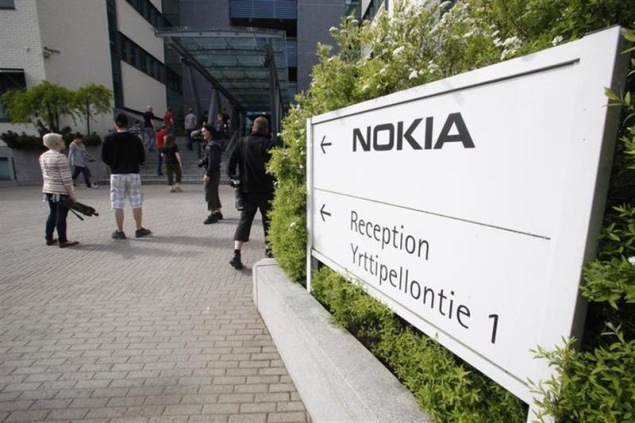- Home
- Others
- Others News
- Finnish city Oulu sees light at the end of the Nokia tunnel
Finnish city Oulu sees light at the end of the Nokia tunnel

Oulu, with a population of about a quarter million, was once a key Nokia R&D site, before the mobile maker was left for dead in the global smartphone race by Apple's iPhone and handsets running Google's Android software.
Nokia and its networks venture at one point employed about 5,000 people in Oulu, more than three times the next biggest private sector employer, but now it has work for less than half that.
The city's unemployment rate topped 16 percent in the summer, a level not seen since the Finnish financial crisis of the early 1990s.
But despite the gloom, and an average annual temperature of 2 degrees Celsius (36F), the buds of a recovery are visible in Finland's biggest northern city, 600 kilometres from Helsinki.
It is becoming a model for the rest of the country as it fights to fill the gap left by Nokia's tumbling sales and the tens of thousands of job cuts that preceded the former world beater's September decision to give up the mobile business and sell to Microsoft.
(Also see: Microsoft to acquire Nokia's Devices & Services business in 5.44 billion euros deal)
Oulu is now a leading candidate to host a new data centre for Microsoft, which wants to invest $250 million on such facilities in Finland after it takes over the Nokia business next year.
Former "Nokians" are starting to land on their feet, too.
Pasi Leipala, a former senior manager at Nokia, is now chief executive at Haltian, which designs electronics and software products and is one of the city's most successful start-ups.
Last year you could count its employees on the fingers of one hand. Now it has a staff of 70.
"The best thing about Oulu is that there are so many skilled people; it's easy to hire some of the best talents," said Leipala.
U.S. wireless chipmaker Broadcom is expected to save hundreds of jobs by buying the Finnish wireless modem division of Japan's Renesas Electronics, which previously planned to dismiss all employees in Oulu, most of whom had transferred from Nokia back in 2010.
Telecom equipment maker Nokia Solutions and Networks, which will account for 90 percent of group turnover after the sale of the handset division, also plans to keep its 2,300 workers in Oulu, and there is talk of hiring more.
Oulu's resilience is in part a national story, the fruits of a determined focus on educational standards, which keeps the nation of 5.4 million people competitive. Finnish students score highly in international proficiency tests, and an OECD test in October showed its adults second only to the Japanese in both literacy and numeracy.
But even by Finnish standards, Oulu outperforms. A high concentration of technology and science researchers, including those at the University of Oulu and Oulu University of Applied Sciences, means that head for head it outperforms Helsinki by more than two to one in terms of the volume of registered intellectual property rights, according to city officials.
Make local, sell global
The city doesn't just depend on hi tech, however.
Many residents take a short drive to the nearby industrial neighbourhoods to work in traditional businesses such as forestry and machinery.
These sectors have struggled through Europe's long period of economic stagnation. Finnish industrial output fell for the 12th straight month in October, and the Bank of Finland expects GDP to contract 1 percent in 2013.
Some local businesses, however, are finding ways round that weakness. Johanna Koskelainen, CEO of Kymppi-Eristys, a family-owned business specialising in industrial scaffolding and insulation for mining and industrial projects, managed to grow sales this year thanks to overseas contracts.
Its biggest customer has been Stora Enso's new pulp plant in Uruguay, and more than half the company's sales comes from outside Finland.
"We have to be more global. In Finland I don't see many big projects in the future," she said. "The growth is now coming 100 percent from abroad."
Honkamajat, which makes log houses, has also been growing in overseas markets such as Japan and Russia, while incorporating automation technologies to make the manufacturing and delivery process more efficient.
"We're now exporting log houses to more than 30 countries," said CEO Kari Tolvanen in the company's plant in the outskirts of Oulu. "For example, that one will be taken to Moscow by truck," he said, pointing to logs being machine-cut with millimetre precision.
He expects sales this year will be near levels before the global financial crisis of 2008, thanks to strong overseas sales. Without exports, he would be at the mercy of a local factory-made log house market that by total turnover is still around 25 percent lower than pre-crisis levels.
Winter blues
While Oulu's light summer nights and quirky events such as the Air Guitar World Championships attract visitors, some local entrepreneurs have even managed to capitalise on the long dark winters.
Valkee, a company that sells headsets designed to relieve seasonal affective disorder (SAD), a depressive condition that peaks in the cold sunless months, was founded by former Nokia engineer Antti Aunio and his scientist friend Juuso Nissila.
Like many Finns, Aunio struggled with SAD and asked Nissila for advice.
They went on to develop portable devices that treat the condition by channelling bright light directly to photosensitive regions of the brain through the ear canal. It raised 7.4 million euros from investors in June, adding to a previous round in which angel investor Esther Dyson took part.
Others are hoping to emulate their success, helped by funding from Nokia's Bridge programme for former employees looking to start new businesses, as well as the state's Tekes fund, which grants money to technology start-ups.
A start-up centre backed by the city and local universities is due to hold a unique event in February called Polar Bear Pitching, in which start-ups are invited to deliver pitches to potential investors in freezing cold water from inside holes cut in the ice. The cold, they say, will make them cut to the chase.
Kari Kivisto, another former Nokia employee, said Oulu would innovate its way out of the downturn, recovering as it once did after the tar industry collapsed in the 19th century. The city was a centre of tar production in the days of wooden ships, but their iron and steel successors put paid to that.
"The tar business once flourished, and then all of a sudden it disappeared," said Kivisto, whose start-up Spektikor makes disposable heart-rate monitors that flash vital signs and help paramedics respond efficiently.
"Once again we're seeing tremendous change. We'll survive."
© Thomson Reuters 2013
Get your daily dose of tech news, reviews, and insights, in under 80 characters on Gadgets 360 Turbo. Connect with fellow tech lovers on our Forum. Follow us on X, Facebook, WhatsApp, Threads and Google News for instant updates. Catch all the action on our YouTube channel.
Related Stories
- Samsung Galaxy Unpacked 2026
- iPhone 17 Pro Max
- ChatGPT
- iOS 26
- Laptop Under 50000
- Smartwatch Under 10000
- Apple Vision Pro
- Oneplus 12
- OnePlus Nord CE 3 Lite 5G
- iPhone 13
- Xiaomi 14 Pro
- Oppo Find N3
- Tecno Spark Go (2023)
- Realme V30
- Best Phones Under 25000
- Samsung Galaxy S24 Series
- Cryptocurrency
- iQoo 12
- Samsung Galaxy S24 Ultra
- Giottus
- Samsung Galaxy Z Flip 5
- Apple 'Scary Fast'
- Housefull 5
- GoPro Hero 12 Black Review
- Invincible Season 2
- JioGlass
- HD Ready TV
- Latest Mobile Phones
- Compare Phones
- Lava Bold N2
- Vivo V60 Lite 4G
- Tecno Pova Curve 2 5G
- Lava Yuva Star 3
- Honor X6d
- OPPO K14x 5G
- Samsung Galaxy F70e 5G
- iQOO 15 Ultra
- Asus Vivobook 16 (M1605NAQ)
- Asus Vivobook 15 (2026)
- Brave Ark 2-in-1
- Black Shark Gaming Tablet
- boAt Chrome Iris
- HMD Watch P1
- Haier H5E Series
- Acerpure Nitro Z Series 100-inch QLED TV
- Asus ROG Ally
- Nintendo Switch Lite
- Haier 1.6 Ton 5 Star Inverter Split AC (HSU19G-MZAID5BN-INV)
- Haier 1.6 Ton 5 Star Inverter Split AC (HSU19G-MZAIM5BN-INV)







![[Partner Content] OPPO Reno15 Series: AI Portrait Camera, Popout and First Compact Reno](https://www.gadgets360.com/static/mobile/images/spacer.png)









